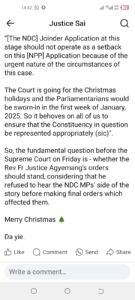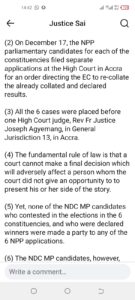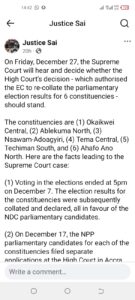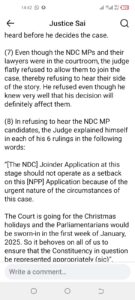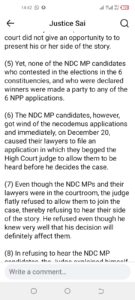adverts
Renowned legal practitioner and lecturer Justice Srem-Sai has provided an in-depth analysis of the National Democratic Congress (NDC)’s legal battle against the Electoral Commission (EC) of Ghana over the recollation and redeclaration of parliamentary election results in five constituencies initially declared in favour of the party.
In a statement shared on Facebook on December 25, 2024, Justice Srem-Sai clarified that the NDC’s Supreme Court challenge is based on a High Court ruling that nullified results in Okaikwei Central, Ablekuma North, Nsawam-Adoagyiri, Tema Central, and Techiman South. This ruling led to a recollation and redeclaration of the results.
Justice Srem-Sai explained that the crux of the NDC’s case lies in the principle of natural justice, which mandates that no court can make a final ruling adversely affecting a person without first giving them an opportunity to be heard.
adverts
“The fundamental rule of law is that a court cannot make a final decision that will adversely affect a person whom the court did not give an opportunity to present his or her side of the story,” he wrote.
According to Srem-Sai, the NDC’s contention is that Rev. Fr. Justice Joseph Agyemang, the High Court judge who presided over the case, violated this principle by annulling the initial declarations and ordering the recollation and redeclaration without hearing the parliamentary candidates from the affected constituencies, even though they were present in court with their lawyers.
Srem-Sai detailed how the NDC parliamentary candidates, upon learning of the case, immediately filed an application on December 20, 2024, requesting to be heard before any decision was made. However, their application was dismissed.
“Even though the NDC MPs and their lawyers were in the courtroom, the judge flatly refused to allow them to join the case, thereby refusing to hear their side of the story. He refused even though he knew very well that his decision would definitely affect them,” he stated.
The judge justified his decision by citing the upcoming Christmas break and the impending swearing-in of the next parliament.
Justice Srem-Sai concluded that the primary question before the Supreme Court is whether Rev. Fr. Justice Agyemang’s orders can stand, given that he refused to hear the NDC candidates’ side of the story before issuing rulings that directly impacted them.
The Supreme Court is expected to deliberate on the matter on Friday, with the outcome likely to have significant implications for the parliamentary composition and the broader electoral process.
Read his full statement below:
On Friday, December 27, the Supreme Court will hear and decide whether the High Court’s decision—which authorised the EC to recollate the parliamentary election results for 6 constituencies—should stand.
The constituencies are (1) Okaikwei Central, (2) Ablekuma North, (3) Nsawam-Adoagyiri, (4) Tema Central, (5) Techiman South, and (6) Ahafo Ano North. Here are the facts leading to the Supreme Court case:
(1) Voting in the elections ended at 5 pm on December 7. The election results for the constituencies were subsequently collated and declared, all in favour of the NDC parliamentary candidates.
(2) On December 17, the NPP parliamentary candidates for each of the constituencies filed separate applications at the High Court in Accra for an order directing the EC to recollate the already collated and declared results.
(3) All the 6 cases were placed before one High Court judge, Rev. Fr. Justice Joseph Agyemang, in General Jurisdiction 13, in Accra.
(4) The fundamental rule of law is that a court cannot make a final decision that will adversely affect a person whom the court did not give an opportunity to present his or her side of the story.
(5) Yet, none of the NDC MP candidates who contested in the elections in the 6 constituencies and who were declared winners were made a party to any of the 6 NPP applications.
(6) The NDC MP candidates, however, got wind of the necodemus applications and immediately, on December 20, caused their lawyers to file an application in which they begged the High Court judge to allow them to be heard before he decides the case.
(7) Even though the NDC MPs and their lawyers were in the courtroom, the judge flatly refused to allow them to join the case, thereby refusing to hear their side of the story. He refused even though he knew very well that his decision would definitely affect them.
(8) In refusing to hear the NDC MP candidates, the judge explained himself in each of his 6 rulings in the following words:
“[The NDC] Joinder Application at this stage should not operate as a setback on this [NPP] Application because of the urgent nature of the circumstances of this case.
The Court is going for the Christmas holidays, and the parliamentarians would be sworn in in the first week of January, 2025. So it behoves all of us to ensure that the constituency in question be represented appropriately (sic)”.
So, the fundamental question before the Supreme Court on Friday is whether Rev. Fr. Justice Agyemang’s orders should stand, considering that he refused to hear the NDC MPs’ side of the story before making final orders that affected them.
